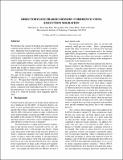Directoryless shared memory coherence using execution migration
Author(s)
Lis, Mieszko; Shim, Keun Sup; Cho, Myong Hyon; Khan, Omer; Devadas, Srinivas
DownloadDevadas-Directoryless shared.pdf (539.4Kb)
OPEN_ACCESS_POLICY
Open Access Policy
Creative Commons Attribution-Noncommercial-Share Alike
Terms of use
Metadata
Show full item recordAbstract
We introduce the concept of deadlock-free migration-based coherent shared memory to the NUCA family of architectures. Migration-based architectures move threads among cores to guarantee sequential semantics in large multicores. Using a execution migration (EM) architecture, we achieve performance comparable to directory-based architectures without using directories: avoiding automatic data replication significantly reduces cache miss rates, while a fast network-level thread migration scheme takes advantage of shared data locality to reduce remote cache accesses that limit traditional NUCA performance. EM area and energy consumption are very competitive, and, on the average, it outperforms a directory-based MOESI baseline by 1.3 x and a traditional S-NUCA design by 1.2 x. We argue that with EM scaling performance has much lower cost and design complexity than in directory based coherence and traditional NUCA architectures: by merely scaling network bandwidth from 256 to 512 bit flits, the performance of our architecture improves by an additional 13%, while the baselines show negligible improvement.
Date issued
2011-12Department
Massachusetts Institute of Technology. Computer Science and Artificial Intelligence Laboratory; Massachusetts Institute of Technology. Department of Electrical Engineering and Computer ScienceJournal
Parallel and Distributed Computing and Systems
Publisher
ACTA Press
Citation
Lis, Mieszko et al. “Directoryless Shared Memory Coherence Using Execution Migration.” Parallel and Distributed Computing and Systems, December 2011.
Version: Author's final manuscript
ISSN
1925-5543